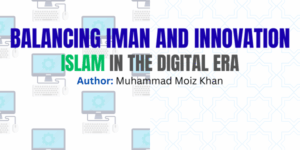In today’s hyper-connected world, technology influences everything, from the way we work to the way we think. But with this digital transformation comes a critical question: Are we using technology responsibly? Digital ethics is more than a buzzword; it’s the moral compass that guides how technology is designed, deployed, and experienced. It asks whether innovation respects human dignity, privacy, fairness, and agency.
What is Digital Ethics?
Digital ethics refers to the set of principles, values, and norms that govern behavior in the digital realm. It covers how data is collected and used, how algorithms make decisions, and how people interact online.
Key areas include: privacy (who owns and controls data), AI fairness (are models biased?), cybersecurity (protecting systems without invading rights), and digital citizenship (how we behave online).
The Rise of AI and New Ethical Dilemmas
Artificial Intelligence brings powerful benefits, medical diagnostics, automation, and personalization but it also creates new ethical dilemmas. When algorithms influence hiring, lending, medical care, or content recommendation, the stakes become human lives and livelihoods.
Ask yourself: Should AI replace human judgement? Can we trust opaque models to treat people fairly? And who fixes the mistakes when AI misjudges?
Why Digital Ethics Matters for Businesses
For organizations, ethical digital practices build long-term trust. A single privacy breach, biased algorithm, or misleading product experience can erode customer confidence and invite regulatory penalties.
Ethical technology practices deliver measurable value: increased customer loyalty, reduced legal risk, better employee morale, and more resilient systems.
Agencies like KKLinkz help businesses integrate these principles into their digital strategies.
Shared Responsibility: Citizens, Companies, Governments
Creating an ethical digital future requires contributions from everyone. Individuals must practice critical thinking and protect their privacy. Companies must prioritize transparency, fairness, and security. Governments must craft proportionate policies that protect rights without stifling innovation.
Examples of good practice include open model documentation, privacy-by-design engineering, ethical review boards, and digital literacy programs.
For businesses looking for guidance, KKLinkz offers resources on ethical digital marketing and strategy.
Practical Steps to Make Technology Ethical
Start simple: map data flows, audit models for bias, publish privacy notices in plain language, and create channels for affected users to appeal automated decisions. Use third-party audits where needed and adopt minimum-viable transparency for complex systems.
For teams building AI: document datasets, keep human-in-the-loop checkpoints for high-stakes outcomes, and monitor deployed models continuously for drift and unintended harms.
Final Thoughts
Digital ethics doesn’t slow progress; it steers it. The technologies we create and the rules we choose today will define whether the digital era amplifies justice or entrenches harm. The choice is collective: will we shape technology, or let technology shape us?
If you build, buy, or use technology, commit to one ethical action this week: review a privacy setting, question an automated decision, or read a model card. Small actions compound into cultural change.
For businesses seeking guidance, treat ethics like product quality, embed it into design reviews, release processes, and KPIs. For citizens, treat digital literacy like a civic duty. Together we can make the web a place of trust, dignity, and shared benefit.
This article was prepared by the team at Postify Creative, a digital marketing agency committed to ethical and innovative online strategies. Learn more about building responsible digital campaigns on our website.




